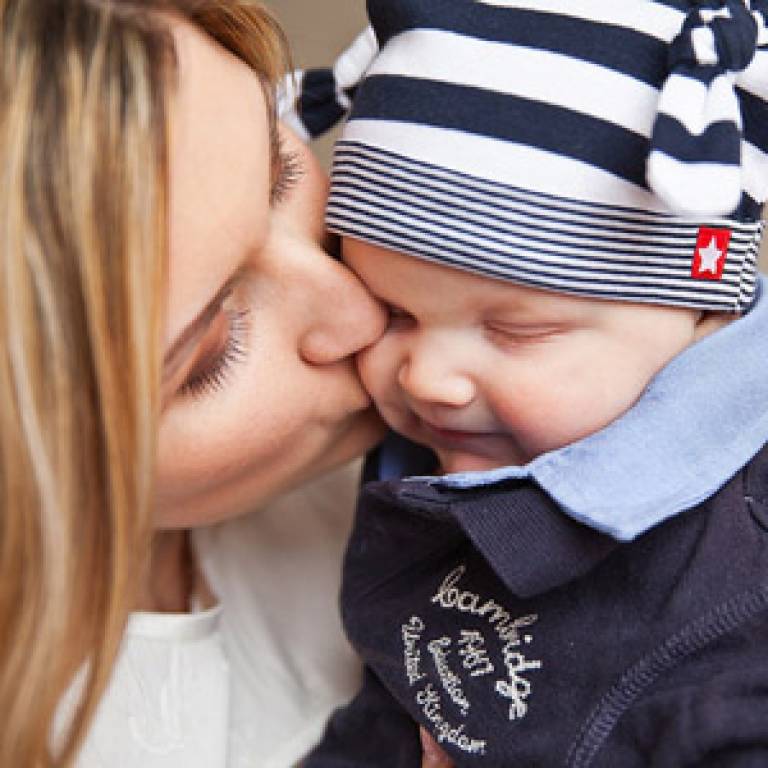Children of more caring, less controlling parents live happier lives
4 September 2015
A UCL-led lifelong study of people in England, Scotland and Wales has found that those who perceived their parents as more caring and less psychologically controlling during their childhood were likely to be happier and more satisfied throughout their lives.

Care from both mother and father were found to be equally important predictors of participants' mental wellbeing through to middle age, although paternal care had a greater association with wellbeing in later life (age 60-64).
People whose parents exerted greater psychological control during childhood had significantly lower mental wellbeing during adulthood than those with less controlling parents, with an effect size similar to the recent death of a close friend or relative.
The study monitored the mental wellbeing of participants in the Medical Research Council (MRC) National Survey of Health and Development between the ages of 13 and 64. The survey tracked 5,362 people since their birth in 1946, of whom 2,800 remain under active follow-up. 3,699 participants had complete wellbeing data at ages 13-15, falling to approximately 2,000 by ages 60-64.
Published in The Journal of Positive Psychology, the research highlights how parenting can have long-term positive impacts on wellbeing that continue through to older age. The results were controlled for confounding variables including parental separation, childhood social class, maternal mental health and participants' personality traits.
Parents are vitally important to the mental wellbeing of future generations. Policies to reduce economic and other pressures on parents could help them to foster better relationships with their children.
Dr Mai Stafford
"We found that people whose parents showed warmth and responsiveness had higher life satisfaction and better mental wellbeing throughout early, middle and late adulthood," explains lead author Dr Mai Stafford from the MRC Unit for Lifelong Health & Ageing at UCL. "By contrast, psychological control was significantly associated with lower life satisfaction and mental wellbeing. Examples of psychological control include not allowing children to make their own decisions, invading their privacy and fostering dependence."
Psychological control was studied separately to behavioural control, which had no significant effect on mental wellbeing in later life. Behavioural control broadly refers to not letting children have their own way, for example not letting them go out as often as they like.
"We know from other studies that if a child shares a secure emotional attachment with their parents, they are better able to form secure attachments in adult life," explains Dr Stafford. "Parents also give us a stable base from which to explore the world, while warmth and responsiveness has been shown to promote social and emotional development. By contrast, psychological control can limit a child's independence and leave them less able to regulate their own behaviour.
"Parents are vitally important to the mental wellbeing of future generations. Policies to reduce economic and other pressures on parents could help them to foster better relationships with their children. Promoting a healthy work-life balance is important as parents need time to nurture relationships with their children."
The researchers measured the three different concepts of care, psychological control and behavioural control using a 25-item questionnaire designed to assess parental bonding. Participants completed the questionnaires retrospectively as adults to describe how they remembered their parents' attitudes and behaviours before they were 16 years old.
Care was measured by agreement with statements such as 'Appeared to understand my problems and worries' and 'Was affectionate to me'. Psychological control was assessed by agreement with phrases such as 'Tried to control everything I did' and 'Tried to make me feel dependent on her/him'. By contrast, behavioural control was determined by disagreement with sentiments including 'Gave me as much freedom as I wanted' and 'Let me go out as often as I wanted'.
Links
- Dr Mai Stafford's academic profile on IRIS
- MRC Unit for Lifelong Health & Ageing at UCL
- Medical Research Council
Images
- Mother kissing her baby (courtesy of BK on Flickr)
Media contact
Harry Dayantis
Tel: +44 (0)20 3108 3844
Email: h.dayantis [at] ucl.ac.uk
 Close
Close

